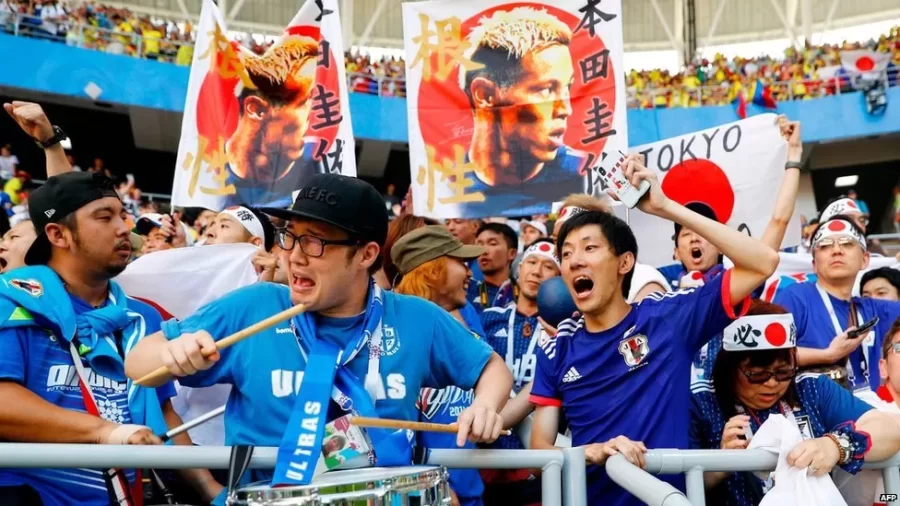Qatar’s World Cup: Enjoy the Games, Understand the Injustice
November 8, 2022
International relations, politics, and cultural differences are messy. Every four years the world gets to escape these complicated situations, unite together, and embrace “the beautiful game.” No matter if you call the sport soccer, football, or anything in between, the World Cup always provides top-level drama while showcasing amazing players, unique play styles, and rich sporting cultures. In modern times, the event has become so popular that countries submit multi-billion dollar bids to host the month-long event.
All the way back in 2010, the middle-east nation of Qatar won the bid to host the games 12 years later. Qatar had the money to win the bid, but the country has improper conditions and facilities to host such an event. The Qatari government exploited migrant workers to death in order to build world-class stadiums for the World Cup. Qatar’s questionable morals stand in opposition to what makes the games so great, unity and acceptance. Fans of the competition all over the world are having to navigate the injustice behind Qatar’s event, while also preparing to enjoy the long-awaited tournament that always brings joy across the globe.
Qatar is a Middle East country known by many as a hotspot for booming new-age cities, much like other countries in the region such as the United Arab Emirates. While this is true, the nation of Qatar also is well-known for its systemic problems regarding the rights of migrant workers. The country has a well-established “Kafala” system which gives employers control over workers from other countries. This system limits the workers from leaving their jobs and even the country. For a technologically ahead and relatively progressive country, Qatar has become infamous for its treatment of low-class foreign laborers.
To host the World Cup, Qatar needed state-of-the-art stadiums as well as improved transit accessibility. These massive changes needed to occur in the country in only twelve years so the nation turned to migrant workers and the lower classes in order to build these stadiums and facilities to host this massive event.
According to The Guardian, at least 6,500 migrant workers from India, Pakistan, Bangladesh, Nepal, and Sri Lanka have died since Qatar was awarded the tournament in 2012. The same report states that various causes contributed to the deaths of these workers. Natural deaths occurred from applications such as heart and lung failure because of the horrid hours and scorching temperatures the workers labored through. This report also shows that the workers died because of work-related injuries. Such confirmed cases include shock from electricity cables and falls from heights.
These tragic causes are seen as troubling signs to both football fans and people all around the world. Spectators are questioning why FIFA (the organizer of the tournament) is not punishing Qatar by taking away their privilege of hosting the event. Still, the event that so many look forward to will start November 20th, as Qatar plays Ecuador to kick off the festivities. Countries, individual players, sporting brands, and fans are all responding to the situation and trying to call out the injustice at hand, while also celebrating the beauty of the World Cup and what makes international sport so great.
Many important figures from around the footballing landscape have criticized the competition. French footballing legend Thierry Henry has publicly condemned FIFA as well for their mishandling of the situation, and he is also a vocal supporter of players speaking out against this injustice. Liverpool captain and member of the English squad Jordan Henderson was shocked by the information he had heard coming out of reports from Qatar. “It’s horrendous really when you look at some of the issues that are currently happening and have been happening over there.” Many fans believe that speaking out is not enough, and stand in support of countries fully pulling out of the competition.

Sporting brand Hummel is the official sponsor of team Denmark, and instead of clothing the Danish team in an elaborate kit as commonly custom during the World Cup, Hummel designed plain red and plain black jerseys. The company released a statement after the drop of the kits. “We don’t wish to be visible during a tournament that has cost thousands of people their lives.” However, the kits show how they still stood behind the team they sponsor, saying, “We support the Danish national team all the way, but that isn’t the same as supporting Qatar as a host nation.” Hummel is noticing and calling out this injustice, but also believing in the beautiful, unifying spirit this competition is all about.
U of D Jesuit student and soccer captain Brandon Alchy is traveling to Qatar with his family this November for the World Cup. Alchy loves the game but believes Qatar’s inhumane treatment goes against what the sport and competition are about. “Human rights violations completely go against what the World Cup stands for. The World Cup is about joy and unity.”
A common reaction from people all around the world is to criticize the Qatari government for their abuse of migrant workers and condemn FIFA for not batting an eye to these allegations. In a complicated situation, many feel discouraged that the beautiful event that the world is treated to every four years is being tainted. As fans of the sport and citizens of the world, it is important to notice this injustice, but it is also important to understand and appreciate the positives the World Cup brings to the planet.
As you watch the tournament in November, try to understand, appreciate, and learn about different sporting cultures from all around the world. Be amazed by Sadio Mane, one of the best players in the world who represents and inspires the small African nation of Senegal. Embrace and soak in the chants, costumes, and celebrations fans bring to the World Cup. Notice the beautiful clash of playstyles that takes place when teams from across the globe take the pitch together. Research a country that you don’t know much about so you can better educate yourself to understand the world around you. By doing this, you are embracing different cultures, showing respect for others, and realizing that the world is so much bigger than you. You are moving our world away from persecution and abuse to a world of acceptance and positivity.











Bill Jamieson • Nov 14, 2022 at 8:16 pm
Excellent article that reminds the reader that passion for human rights should overshadow frenzy for soccer.